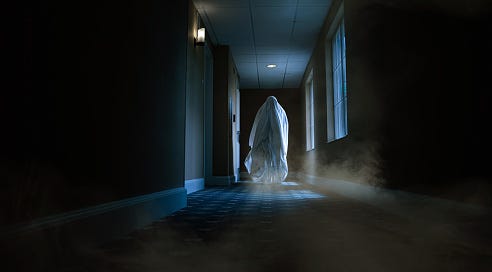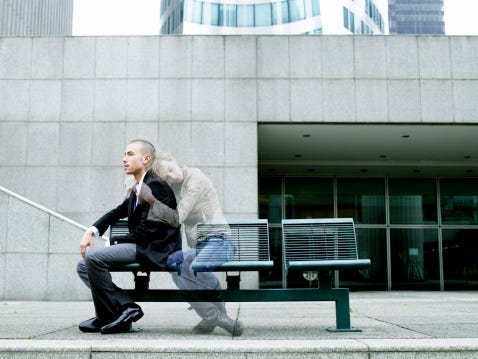For the mid-week post that divides our ghost story numbers on Sundays, I said I would write more personally about my own experiences with the supernatural.
Things I can’t explain.
Do I believe in ghosts? It’s a good question.
If you know my work at all, you will know that I was brought up as the adopted child of Pentecostal parents in a poor town in the north of England. You can read about this as a fiction version : ORANGES ARE NOT THE ONLY FRUIT.
Or in the memoir pictured below.
My parents, and everyone in the church, believed in the whole panoply of non-material entities. If you believe in God, then it follows logically enough to believe in angels, demons, evil spirits, shades, lost souls, earthbound presences, revenants, ghosts, ghouls, voices in the air, hauntings, summonings; the dead as part of life.
All of the above has been common enough across all times and all cultures. In England, during the 1600s, the Puritan tendency in religious matters disallowed ghosts – they were seen as a superstition of the corrupt Catholic church. But then, the Puritans also banned Christmas for a while. Feasts and ghosts were just too Catholic.
It’s worth remembering that the Puritans exported their disapproval of the Beyond to America. Anything other-worldly that was not in direct contact with God, must be Satanic. To admit to being visited by a ghost was to admit to some demonic intervention. The Dead were in Heaven or Hell – and the ones in Heaven weren’t doing the rounds on earth.
The witch-trials, so popular in England, and most horrific where I come from in Lancashire, later made their way to America, at Salem. They were certainly about fear of the power of women, but those trials were also focussed on eliminating any idea that otherworldly interventions, or experiences, were anything but evil.
The human mind won’t be corralled though… whatever the laws, bans, edicts of the day. Folks went on believing in spirits and visitations.
As a small girl of 5 years old I was with my grandma when she died. She slept in a bed downstairs, and I used to get up before anyone else, to go down and sit on her bed. Throat cancer meant she couldn’t speak, so we looked at Bible story picture books together, and I read to her. I wasn’t at school then, but my mother had taught me to read early, and well, and words were my friends.
One morning, Grandma got out of bed and went to the big bay window overlooking the garden. This was my grandfather’s house. Our own house was a terraced house – a row house - with just a rear yard. My mother was nursing her mother at the time, and so we all moved into grandad’s house. It was an unhappy, tense time. My mother hated her father, and he hated having us in the house. But he could save money on hiring a nurse, cook, and cleaner. The one thing they all enjoyed were roses. Old-fashioned scented, English roses
Grandma spoke, ‘Look at the Queen of Denmark.’
I went to the window and stood with her. Then, she walked through the window into the garden, and along the rose hedge. It was so natural. There she was, in the garden, among the flowers she loved.
I heard someone coming downstairs. It was my mother. I ran into the hall and told her that Grandma and the Queen of Denmark were in the garden.
At that moment the telephone on the hall table began to ring. This was in the 1960s, but the telephone was from the 1920s. My mother was born in 1922, and she said she remembered when the family motor business got the telephone. The style was called a Sit Up and Beg.
My mother picked up the receiver and the base - speaking and listening were in two parts.
‘Hello. Woodfield House. Hello?’
There was no-one there. We went into the sitting room together.
Grandma was in bed.
Grandma was dead.
My parents were wartime parents. My father had been in the D-Day Landings. My mother was an Air Raid warden. Granddad had fought in the First World War. I lived with two generations of traumatised adults who had been taught to laugh it off and carry on. They all had tales of the Dead. All of them, without sensationalism, told me stories of being visited by the spirit of a wartime pal, or loved one, just before death.
I accepted these stories as children do accept what grown-ups tell them. At the same time, I had, (and have), a vivid imagination. Like most children I didn’t fully distinguish between living and non-living objects. My teddy bear was my friend. My Grandma’s behaviour on the day of her death seemed like part of everything else - a world not clearly divided but entangled.
So, what did happen that day? I know I wasn’t frightened, and I can see the scene clearly.
It may be that as we pass from one state to another – even if that subsequent state is oblivion, we have a rare period of non-body presence. We are not yet dead, but we are not body-dependent.
Perhaps my Grandma was thinking of the rose garden as she sensed that she was leaving her body behind – and perhaps her thought was powerful enough to transmit to me. Children are wonderfully receptive to thought-visions. It maybe that what they ‘see’ are powerful mental projections.
Or it may be that the imprint of a person can leave their mortal self for a time. Shamans certainly believe that. I don’t say ‘soul’ or ‘spirit’, because that implies an onward destination. ‘Imprint’ measures only the moment of appearing, with no conjecture as to what might happen next.
My mother said that she talked with Grandma on two occasions in the following week. This comforted her. It’s also a very common experience, and the obvious explanation is that our longing makes the experience seem real.
My first story, here on Substack, App-arition, was built round the news this year of the Microsoft patent for their dead person app. I think it’s a horrible idea because loss must be faced, grief endured, time allowed to pass, new beginnings to emerge. An app is not your loved one. I fear though, that it will be popular, and bring with it terrible mental health problems.
Humans are pattern makers. We make patterns with other people in our lives. We are enmeshed. Break-ups mess with the pattern. Death is a break-up of the relationship, and of part of the self. The mind is bewildered and struggling. Managing that period of our lives is a challenge. It is painful. What are the consequences of refusing that challenge? That pain?
Or am I just an analogue human in a digital world?
I realise I haven’t answered my own question: Do I believe in ghosts?
Sometimes I talk out loud to the Dead. Do you?
Sometimes I imagine the Dead are talking to me – and that’s what my next story will be about. It’s a story with its roots in the past - where crimes are committed, but not brought to justice - perhaps that’s something we can do for dead. Who knows?
See you on Sunday.









Yes, I talk to the 'Dead' too. Sometimes out loud but mostly in my mind. I don't like the term 'Dead', because as far as I can understand the body may die, but consciousness doesn't. Ever. And consciousness is not limited by the same things we as humans are subjected to. I find this theme very thrilling and am enjoying the short stories and, above all, I'm thrilled with the mid-week musings and Jeanette Winterson's personal reports regarding ghostly encounters.
Thank you. Absolutely loving the mid week posts.